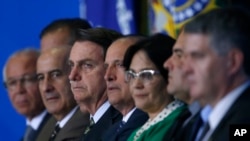President Jair Bolsonaro launched a jobs program Monday largely based on tax reductions as Brazil struggles to put more than 12 million people back to work.
The pension and labor secretary said the administration aims to create 1.8 million jobs for people ages 18-29 and almost 1 million other jobs by the end of 2022.
The jobs package comes amid stubborn double-digit unemployment as well as violent protests elsewhere in South America, including Chile, stemming partly from economic difficulties. Brazil's economy is headed toward its third straight year of roughly 1% growth, following two years of deep recession, and patience is wearing thin.
"People between 18 and 29 have double the (average) unemployment rate. That is why we chose them to be beneficiaries," labor secretary Rogerio Marinho said. "We will make payrolls less expensive over the next three years, responsibly, showing how we will make up for it while respecting the budget."
Marinho said labor costs for employers will fall as much as 34% with the program for young people. Other measures include stimulating microcredit for those currently unable to take out loans, and flexibility to work holidays and Sundays. Left-leaning politicians have opposed Sunday work in the past, arguing it would open the door to exploitation.
The rules are already in effect, but Brazil's Congress must ratify them.
The administration's tax cut aims to encourage employers to hire young people who haven't had a job before and who are often drawn into low-paying informal labor. The program runs through the end of 2022.
"The proposal attacks a market failure. Young people don't have experience, so they don't get jobs. Since they don't get jobs, they don't get experience," said Marcelo Neri, an economist who directs the social policy department at the Getulio Vargas Foundation university. "Moreover, it's the group of people who suffered most in the past five years."
Brazil's unemployment surged during the 2015-2016 recession and has been in the double digits since. Three years ago, Bolsonaro's predecessor, Michel Temer, pitched a labor reform as certain to stimulate jobs. However, most employment gains since have come from informal or part-time work.
Unemployment has come down since its 13.7% peak in 2017, but not fast enough to satisfy a beleaguered workforce. Joblessness was 11.8% in the third quarter, down from 11.9% in the same period a year earlier. Many of those who cast their vote for Bolsonaro last October hoped the shift in policy would reinvigorate the economy.
Brazilians in recent years have turned to self-employment, for example performing odd jobs, doing deliveries on bike or motorcycle and driving for ride-share apps like Uber. Postings for steady jobs, even those paying as little as $400 a month, draw long lines of applicants.
Official data from the third quarter show 4.7 million people are so disheartened that they have stopped looking for work.












